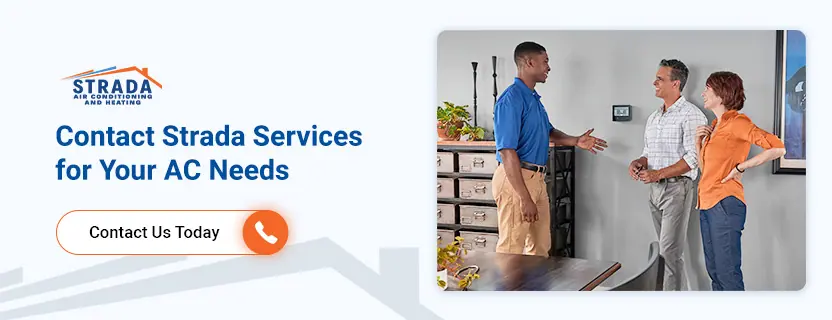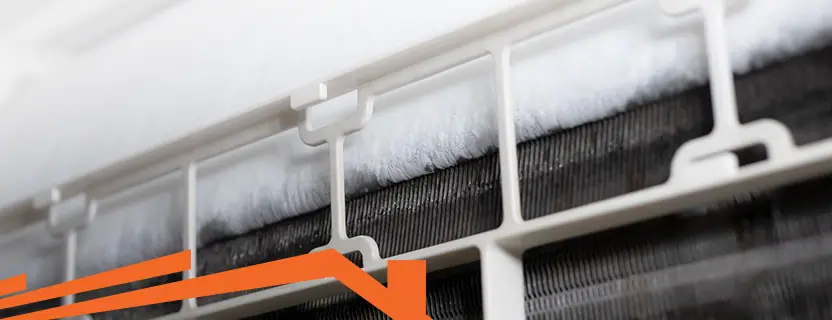
For many people, their air conditioner (AC) is an essential part of their home. High temperatures can make it hard to focus, lead to discomfort and even cause health problems, so it’s a good thing we have these convenient inventions to cool down your home.
Many people take their AC for granted while it’s operating smoothly. However, you’ll likely notice if it stops working. When your home no longer offers a cool refuge from the blistering outdoor heat, it’s a sign that something isn’t right with your AC.
Ironically, a frozen air conditioner can’t cool down a room. Most people with an AC will experience this issue at least once. If you’re one of the nearly 90% of U.S. households that use air conditioning, you must know what to do when your unit freezes.
Air conditioners are technological machines, which means various problems can occur. If your AC isn’t working correctly, that doesn’t necessarily mean that it’s frozen — it could be due to something else, like a general power outage or your housemate accidentally switching it off.
If you live in a moderate climate, a one- or two-degree difference in your AC might not be drastic enough for you to notice when it stops working. If you live somewhere hot and humid like Florida, where the highs sometimes reach the mid-90s, you’ll immediately know when your AC is frozen because you’ll no longer feel the cool, refreshing air circulating from your AC unit.
There are a few ways to confirm that your air conditioning is frozen. The most common signs to look out for include:
A frozen AC is understandably frustrating, but there are steps you can take to fix it. The first thing you need to do is determine why the system froze since there are multiple reasons your AC might malfunction. Next, see if you can tackle the problem yourself using the following methods:
Once you’ve established the cause of the problem, you can get to work solving the issue. While the steps above are an excellent place to start, some problems require more specific measures to restore your AC. Clogged air filters and refrigerant leaks are two leading causes of a frozen AC.
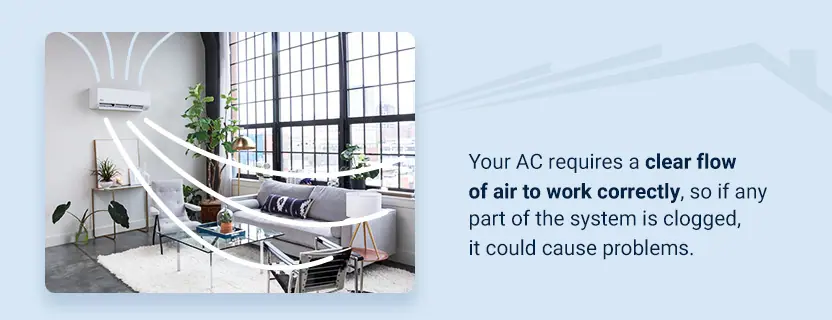
Your AC requires a clear flow of air to work correctly, so if any part of the system is clogged, it could cause problems. While clogging can occur in various parts of the air conditioner, such as the condensate lines, the most common scenario is a clogged air filter. The air filter collects dust and dirt, which can build up until air can’t effectively flow through the filter anymore.
Fortunately, if your AC is frozen due to clogged air filters, it’s usually pretty simple to fix:
AC leaks are another common reason for the system to freeze. Water leaks can be pretty easy to fix, often entailing cleaning the air filter or unclogging the water drain lines. Refrigerant leaks are more complicated, as they can cause the air conditioner’s pressure to drop, making the refrigerant expand and become too cold.
Refrigerant leaks are more complex to fix than superficial problems like clogged filters. In most cases, it’s best to call in a professional. However, there are some at-home steps you should take while you wait for them to assist:
While the reasons above are the most common causes for an AC to freeze over, they’re not the only ones. Other reasons why your air conditioner might freeze include:
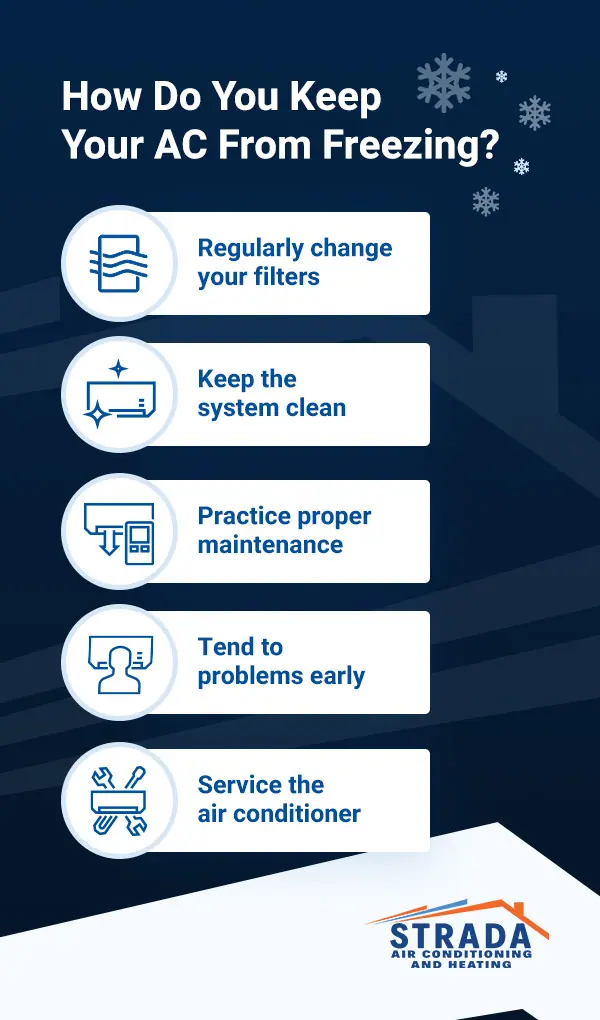
While there are things you can do to get your AC working after it’s frozen, it’s a good idea to know how to stop it from happening again. There are several habits you can implement to keep your air conditioning system working well throughout the year:
As an AC owner, you’ll naturally have questions about your system. These frequently asked questions will help you better understand the system so you can implement AC maintenance best practices.
As a homeowner, you’ll be happy to hear that ACs typically last a long time. However, there’s not just one answer for how long an AC will last. Generally, they should keep running for a good few years, but their lifespan ultimately depends on how well you take care of them.
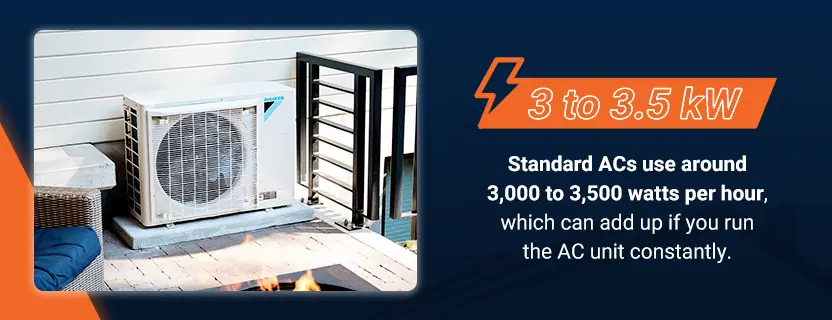
Standard ACs use around 3,000 to 3,500 watts per hour, which can add up if you run the AC unit constantly. As any homeowner in the Southeast will know, it’s natural for your electricity bill to increase when the weather starts warming up and you use your air conditioner more.
Even though most people associate ACs with cooling a room, they’re quite a versatile system since many also have heating capabilities. Thanks to technological advances, most modern-day air conditioners have thermostats that allow you to adjust the temperature to your chosen setting, whether warmer or colder.
There are many ACs out there, allowing you to get one that suits your style and size needs. Generally, the two most common types of ACs are window and central. Window ACs are much cheaper and can cool a specific room, whereas central ACs are more efficient if you want to cool a whole house.
The optimal length of time to run your AC depends on your needs and preferred indoor climate. On hotter days, you’ll likely run your AC for longer, but you should avoid running it unnecessarily as it will increase your electricity bill.
While there are some quick fixes you can try when your air conditioner freezes, there are some situations where calling a professional technician to help you is the best course of action. If you’ve tried some DIY methods and your AC is still not working or freezes very often, there could be a more serious issue that requires expert assistance.
Even if it seems like a minor issue, you can still call a technician if you’re worried about damaging the system and would feel more comfortable having an experienced person help. Keep in mind that if your AC is under warranty, it might state that the only person allowed to work on the AC while it’s under warranty is a technician.
A professional can also assist you in other ways, such as:
When it comes to installing, maintaining or repairing your AC unit, it’s important to ensure that you choose the right company. Because ACs are expensive, you need to have peace of mind that it’s in good hands and that the professional working on it knows exactly what they’re doing.
At Strada Services, we have decades of experience in air conditioning services, making us the preferred provider for many people. Our comprehensive range of services enable us to help air conditioner owners to get the service they need. Whether you require an installation, repair or maintenance service, we are here to support you with exceptional reliability and professionalism.
Fill out our contact form to schedule an appointment, get a quote or receive more information about how we can help you. Our friendly team is available to guide you every step of the way and ensure that your AC stays in excellent shape.
